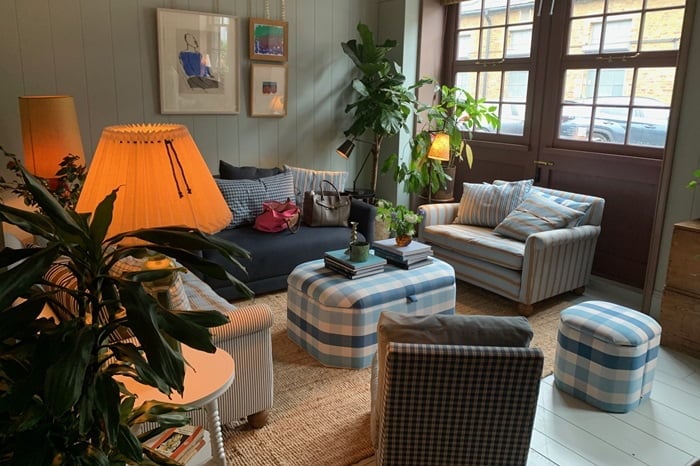Focus on supply chains supports provenance strategies
Focusing strongly on provenance and greater control over the supply chain including moves towards introducing vertical integration are proving critical components of a growing number of retail businesses including those in the furniture and home interiors category.
For Mike Durbridge, CEO of Andrew Martin International and Timothy Oulton, the move towards greater control began five years ago, and was given a boost by Covid-19, as the business shifted to more near-shoring and owning a greater share of the manufacturing part of the supply chain.
Vertical integration
Whereas half a decade ago 80% of its products were sourced from overseas and 20% from the UK and Europe this has switched to 50% UK and Europe and 50% overseas. But of the latter as much as 75% comes from company-owned workshops in Southern China that are so it has great control over the production. This means only 25% of products are presently sourced from third-parties overseas.
“We’ve growth plans so we need control and to bring lead-times down. Vertical integration is very important as you need to be able to stand behind your product manufacturing and feel comfortable,” says Durbridge, adding that Andrew Martin International also owns a leather tannery in Brazil that gives it control over the materials required for its sofas and other leather products.
This scenario not only helps with provenance but also ensures a better handle on the changing product ranges across the two businesses that collectively comprise 16 stores globally and 23 franchised units as well as an interior design operation, a wholesale operation selling into the US, and online operations for both brands.
Durbridge says that typically 20% of the designs introduced each year will be amazing, 30% will be good, 20% okay, and 30% not so good so every year the business retires 30-40% of its range and introduces new goods to replace them. There is also great cyclicality in the category.
This focus on controlling the supply chain and having full visibility of the manufacturing process is also very much integral to the activities and strategy of of Andy Harding, CEO of NiX by Nicola Harding and MD at NH&Co, who says 50% of the products are sourced from the UK and the other half from Europe – predominantly Portugal and Lithuania.
Investing in the supply chain
“On-shoring is a top priority. With long distances for sourcing then provenance is an issue. Building a legacy is part of the business and ultimately our dream is to invest in workshops. When we founded the business we were responsible – do things the right way, create a brand and a proposition for doing business the right way,” explains Harding.
For now it sources much of its fabrics from a family-owned business in Manchester and works with artisans such as a lampshade maker in London who uses traditional methods of production. Close relationships with suppliers is essential for the business because its products – encompassing soft furnishings, accessories, tables, wallpaper and fabrics – are unique and as much as 50% of the larger items including sofas, seats and beds are made-to-order, often bespoke items.
The business started out as an interior design business but has developed into also having a retail arm, which Harding has been building since he joined his wife at the company in mid-2022. The present split is 50:50 between the trade side and the consumer retail arm, which he says works well in tandem because the trade business involves working with interior designers, which can be prone to delays and difficulties managing the erratic volumes.
Playing to your strengths
The retail business is online-only, which very much plays into Harding’s strength as he formerly headed up the website divisions of major retailers including House of Fraser and Arcadia as well as working in the online arms of Carphone Warehouse.
It is a similar story with Durbridge whose experience as director of omni-channel at B&Q and prior to that director of direct channel sales at Vodafone has given him the experience of digital transformations and cultural shifts to successfully build a cross-channel business at Andrew Martin and more recently create an online operation at Timothy Oulton.
“The philosophy was, it was luxury brand that did not sell online and all its products needed a story to be told [in-store] to customers and online was not so much fun. But we decided to give it a go,” he says, adding that sales have reached 5/6% of total revenues but it is still early days when compared to Andrew Martin where 30% of revenues are generated online.
US land of opportunity
There is another common theme between the activities of Durbridge and Harding and that involves the opportunity presented by the US market. For the Andrew Martin and Timothy Oulton operations the US is already a hefty 50% of group sales that are generated through the wholesale arm – that sells into retailers including Restoration Hardware and Williams Sonoma – and through company-owned outlets (there are seven Timothy Oulton outlets in America).
For NiX by Nicola Harding the US represents a big new opportunity. Already 20% of its Instagram followers are in the US and it delivers product into the country via a shipper but this is expected to be boosted massively by the recent launch of a partnership with Dallas-
based Brooks Thomas that specialises in selling high-end British homewares and furniture online and at its Dallas showroom.
“Ultimately three-quarters of our business could be through the Brooks partnership. It’s a great cultural fit and Dallas is very interesting. Texas is a big growth opportunity as it’s much less crowded than LA and New York City,” says Harding.














